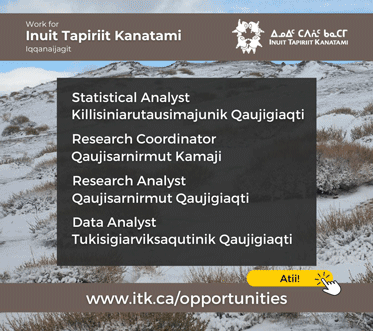A good man on rough water
Joavee Alivaktuk is one of Nunavut’s best known guides. Tourism officials say the territory needs more people like him.
MIRIAM HILL
PANGNIRTUNG — A small blue dinghy sits on the shore, waiting to ferry passengers to a motorboat anchored out in the harbour.
Joavee Alivaktuk is gearing up to take a group to Kekerten Territorial Park in Cumberland Sound. The island, about 50 kilometres south of Pangnirtung, was first used as a whaling station in the mid-1800s. A number of artifacts remain.
The boat trip could take anywhere from an hour-and-a-half to two hours, depending on the weather.
Alivaktuk knows what he’s doing, using few words and a big smile to get everyone organized.
He has been guiding for 15 years. In business with two of his brothers, Alivaktuk runs Alivaktuk Outfitting. The brothers take people by boat to Kekerten, or to Auyuittuq National Park, an hour up the fiord.
Alivaktuk’s boat cost around $49,000, with both engines on the back worth $12,000 each. Today they’ll power the trip to Kekerten Island.
The boat ride to the park is half the fun. Pristine cliffs line the edge of the sound and the boat bumps up and down on the waves as clouds threaten rain.
Alivaktuk says the most challenging part of the job is dealing with Mother Nature, an element he can’t control.
“I like meeting different people and sharing knowledge,” he says.
Born in Iglootalik, Alivaktuk says most tourists ask him what he does in the winter. The answer? He gives guide-training courses. This year he taught three-week courses in both Kimmirut and Iqaluit.
“It’s mainly teaching Inuit how to do this,” he says, gesturing to the controls of the boat. He learned how to be a guide-interpreter by taking a course in Pangnirtung – the first guide-training course ever offered in the region, back in 1984.
Alivaktuk says he’s not getting rich from guiding. He earns enough to get his expenses back, but not much more.
“It’s a really short season,” he says, as he begins to slow the boat to counteract the effect of the waves. Boats can only get to the island for two months every summer. This year hasn’t been particularly busy, but it just depends on the year, he says.
Even though Alivaktuk was trained as a guide, there’s no certification system for outfitters in Nunavut. A guide has to have a business licence and liability insurance, plus an outfitting licence from the Department of Sustainable Development.
A guide also needs the backing of the community in which he’s operating, usually in the form of support from the hunters’ and trappers’ organization.
Alivaktuk pushes a lever down and slows the boat even more. The island is only 25 minutes away now, but he warns that it could be challenging to get the group back on time.
He’s told to push on, and he does.
Alivaktuk points out harp seals visible from the boat’s deck, playing and poking their heads up through the water.
Last year visitors to Kekerten Island also saw bowhead whales and belugas.
Greg Logan, Nunavut Tourism’s product-development coordinator for the Baffin region, sits aboard the boat in a bright red survival suit. He says the territory needs more good outfitters like Alivaktuk. That means training more people, he says.
“We also need more infrastructure, (like) visitors’ centers, arts and crafts buildings.” But it will take money to make that happen, Logan says.
Over the years, Arctic College has facilitated many guide-training courses, with funding coming from the Kakivak Association. Nunavut Tourism acts as a consultant on the training, arranging courses and securing money from other organizations.
“We’re trying to offer more courses that feature components so that people don’t have to take several weeks off just to do a course,” he says.
Nearing the island, Alivaktuk pauses when he’s asked whether he would like to see more tourists in the North.
“I’d like to see more visitors. We’ve got lots of room for visitors,” he says.





(0) Comments